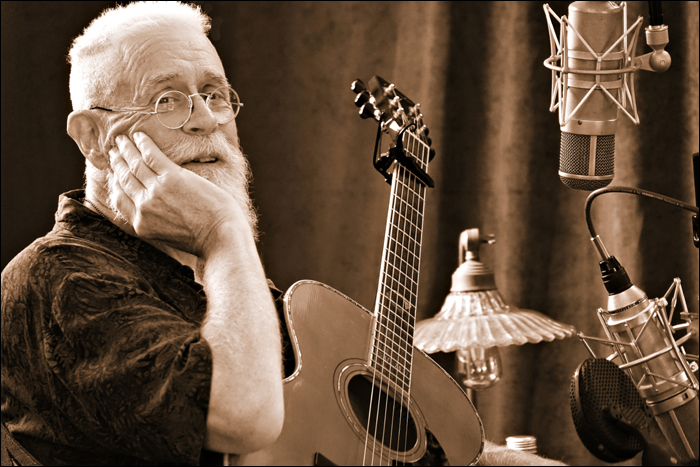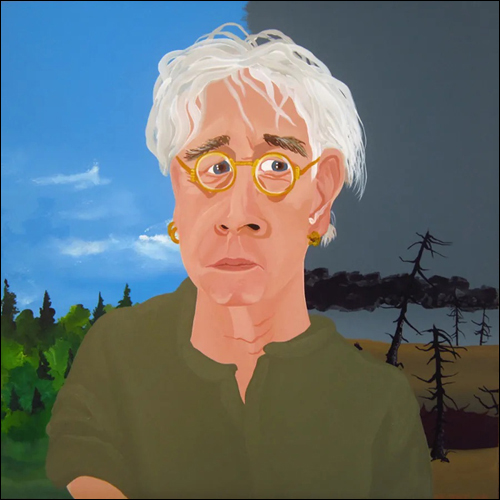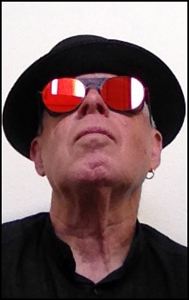‘The songs are written from the view of an old guy,’ says the legendary Canadian musician. ‘I invited people to notice.’
By Lou Fancher
November 16, 2023

If there are albums that cause a person to think about time and tone beyond tempo and a voice’s timbre, Bruce Cockburn’s O Sun O Moon is one of them. Its 12 tracks open onto galaxies of contemplation, with the 78-year-old Canadian singer-songwriter-guitarist now based in San Francisco musing on topics from aging to climate change. Common humanity prevails—track “Orders” reminds that “Our orders said to love them all.” Another song, “Us All,” has Cockburn crooning, “Open the vein, let kindness rain/O’er us all/O’er us all/O’er us all.”
The Canadian Songwriters Hall of Fame musician, whose 22 gold and platinum records have sold nine million copies worldwide, continues his penchant on this 38th album for crafting complex lyrics in marvelously simple, guy-in-a-bar-style language. Their sophistication lies under the surface, with each line honed to sleek essentialism. Cockburn’s impeccable guitar playing is given at this point in his career, but cannot be overlooked—the production elucidates the acoustic elements of his voice and guitar—and on one track, dulcimer—along with those of a stellar group of guest artists.
O Sun O Moon might be Cockburn’s most personal album—even his most optimistic. Songs contemplate the end of life, and puzzle over human inability to care adequately for each other, ourselves, the planet. Lyrics sometimes float, delivering soft scents that seem carried by winds from long ago. Yet at other times, words explode with hard-truth vigor.
“Most optimistic? I’d say I have no idea,” says Cockburn in an interview with 48 Hills. The rest of his reply displays his typical, straight-off-the-cuff dry humor, followed by practical reflection.
“I’d have to go back and listen to them all. But no, I think Dancing In The Dragon’s Jaw was a pretty optimistic record. All the ’70s albums are like that, and it gets darker as time goes on. This new one is certainly more optimistic-sounding than You’ve Never Seen Everything. It’s always been back and forth for me. This album doesn’t have too much tragedy, other than ‘Colin Went Down To The Water.’ That’s specific to being in Maui, when a friend drowned in a scuba accident, but it’s not the kind of tragedy we see all around the world today. If not the most optimistic, this album is certainly one of the more optimistic.”
With two exceptions—the song about his friend and one about global warming, written with Inuk singer Susan Aglukark, Cockburn says O Sun O Moon‘s tracks aren’t inspired by real-life people or happenings. The claim is mildly disingenuous. “On a Roll,” the album’s first track acknowledges an aging body’s crumbling infrastructure, a clear reference to the substantial back pain that has Cockburn fighting to get and remain vertical each day. “But in my soul/I’m on a roll,” the song concludes. Cockburn insists the album is not so much disassociation from human loss and environmental devastation as it is attention to internal tunings that have long been present in his music.
“It was the greater focus I’ve had during the last few years: the spiritual side of things that previously has always been there. That’s always been a conspicuous part of the songs, but there’s a point in your life where you feel you gotta go deeper. These songs reflect that intention, and I have no way to measure how deep I’ve got [he laughs], but the songs reflect that process. ‘O Sun O Moon’ and ‘When the Spirit Walks In the Room’ are certainly about the spiritual side.”
After not writing songs for an extended period of time, Cockburn spent a summer month hanging out with friends and family in a house they had rented on Maui. “The songs came out of getting up early, before everybody else, and sitting on the porch and looking at scenery and playing the guitar. The imagery in those songs reflect that experience. It’s the essence behind the scenery that’s really what the songs are about. They’re not attempts to produce descriptive landscape.”
He refers to “Push Comes To Shove” as “a more straight-up love song,” and says “King of the Bolero” just “came out of nowhere. That song started with an idea that came in San Francsico and had sat around in his notebook for a while—and a memory about a comment someone once made about a man of considerable heft whose double chin wrapped “all the way round his neck.”
That song most surprised Cockburn, who adds, “but it’s like they’re all a surprise; ‘When the Spirit Walks In the Room’ came in hour. I see those things as such a gift. They feel like a surprise; the ones that have to be worked on and take more time, less so. ‘King of The Bolero’ is so utterly non-autobiographical. It was typical of me back in the day, and reminded me of songs on my first two albums, songs like ‘Happy Good Morning Blues.’ There’s a kind of lighthearted surrealism. How vivid it is surprises me. You don’t have to think about it too much. Once the picture is there, it’s just a matter of painting it in.”
The album’s one instrumental piece “Haiku” was written in Maui; its title came from the name of the little village he stayed in.
“It’s another in a long line of guitar instrumentals I’ve come up with over the years. They come from a different process because they’re not triggered by lyrics. They’re triggered by stumbling on something, usually on the guitar. Trying a new tuning and seeing what comes out, for example.” In the case of “Haiku,” he was “stumbling” on what became the first phrase of the piece; moving double stops over a drone bass Cockburn has used in lots of songs.
“It was, where can I take this? It just built up from that. I give myself some sort of jamming room in instrumental pieces like this that aren’t so folky. When I wrote it initially, it was, ‘What can I get the guitar to do here?’ Then when it was almost done, I thought it would be nice if it had a bossanova feel to it. If you’d heard the guitar by itself, your imagination wouldn’t necessarily have taken it in that direction, but that’s where it went to for me. I wouldn’t have minded a little more of bossanova, but what we got was good.”
Asked about messaging, Cockburn says, “I wasn’t thinking of messaging so much, as the stuff that’s on my mind isn’t exclusive to me. We’re all thinking about the same stuff, and the older we get, the more proximate that horizon becomes. Mortality’s never been off the radar for me, from the get-go. I’ve always been aware that life ends. If I think about the actual moment, it makes me nervous. But the concept does not. The older I get, the balance shifts; there’s some reconciliation between those two things. The songs are written from the view of an old guy. I invited people to notice.”
What does a song do? Willing to admit songwriting is indirectly a way of getting people to notice him and his perspectives, Cockburn makes it clear as to what his songwriting is not.
“It’s not about persuading people, it’s about observing, and wanting to share the observation. We’re seeing protests, counterprotests, horrible behavior all over the place. We don’t thrive in that atmosphere. It would nice if we could all just step back, so there is in the songs that underlying feeling. That said, it wasn’t like I was deliberately thinking I had to say something about spirit or manifestations of the divine. It’s just what came up.”
Cockburn’s about to embark on an extensive North American and world tour, which includes appearances December 1 and 2 at Berkeley’s Freight & Salvage. He says the most satisfying songs to play on the road are the new ones—“when I don’t screw them up.” “When You Arrive” is a gas, because he plays it as a sing-along.
“It cracks me up every night when I can hear a whole audience singing, ‘And the dead shall sing/To the living and the semi alive.’ People are bellowing it out and it’s really great,” he says.
The conversation ends with Cockburn saying he’s holding out not just to live for several more decades, but to reach his 500th birthday while still vertical—and writing songs. But before allowing him to return to his daily life (which includes picking his young daughter up from school), one question remains that the non-traditional Christian musician seems to have never been asked: about his favorite hymns. Also, would he most want to sing them during one’s final hours?
“One of them is partly a favorite by association: ‘A Closer Walk With Thee.’ You don’t hear it often these days, but I walked into church on a day before COVID when I wasn’t playing with the band. I came in and they were playing it. It was so cool to hear it as a swung song. It really worked. Another on is ‘Leaning on the Everlasting Arms.’ It comes at the end, and actually runs all the way through, the Coen Brothers’ movie True Grit. They use Iris Dement’s version of it in the soundtrack. It’s beautiful, partly because of the harsh context in which it comes up in the film. It’s a favorite of mine. I’m trying to get my daughter to learn it.
“‘Peace in the Valley,’ I’ve loved that ever since I heard Elvis Presley do it in the ’50s. I actually do know how to play that one. If I get around to doing my imaginary album with the writing of other people’s stuff, that’ll be on it. It’s a Thomas A. Dorsey song and he wrote it for Mahalia Jackson. Her version, the one they recorded, sounds like they did it the way they felt they should. Maybe I’m biased because I’m so attached to the original version I heard, which was Elvis’. I’d have my daughter do that with me too, because she’d be more reliable.”
BRUCE COCKBURN plays December 1 and 2 at Freight & Salvage, Berkeley. More info and tickets here and here. Purchase O Sun O Moon here.
Credit: 48hills.org
Photo: Daniel Keebler









